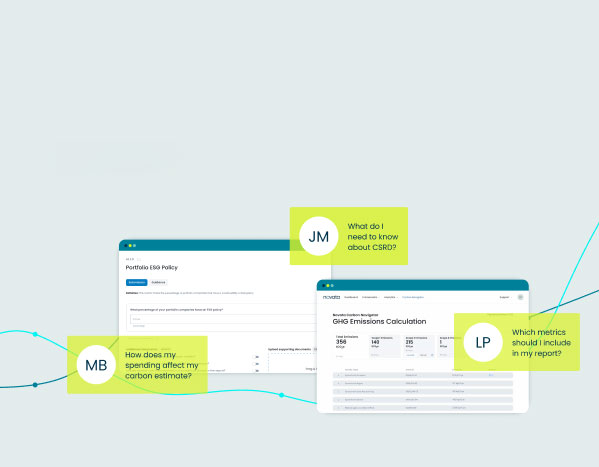The ESG landscape is ever shifting, and 2024 is proving to be no exception. Last month, the European Parliament announced a two-year delay in the adoption of sector-specific standards for non-EU companies reporting under the CSRD. The GRI also announced an update to its Biodiversity reporting standard as biodiversity risk continues to move toward center stage.
As we move further in 2024, here are some of the key topics and trends we’re keeping an eye on as it relates to ESG in the private markets. We’ve garnered insights from Novata’s recent webinar on ESG and Sustainability Trends in 2024 with Josh Green, COO and Co-founder at Novata, Ali Frey, O.P.S. Manager, ESG at Clearlake Capital Group, Paul Yett, Director of ESG & Sustainability at Hamilton Lane, and Sonia Lagourgue, Purpose & ESG Leadership at Georgian.
1. Increased and Stricter Enforcement of Sustainability Regulations
This year, a number of reporting regulations come into effect, including the EU’s Corporate Sustainability Reporting Directive (CSRD), International Sustainability Standards Board (ISSB)’s IFRS S1 and S2 standards, and California’s climate disclosure bills. In addition, regulators are set to be tougher on disclosures, with the EU already cracking down on greenwashing by banning misleading sustainability labeling. The rise in new regulations and stricter enforcement of existing regulations signals a tipping point in the pursuit of greater corporate transparency. Firms can no longer afford to neglect ESG in their operations.
While the regulations may introduce some level of data consistency across the board, investors will have to strike a balance to avoid feeling overburdened by these increasingly extensive reporting asks. During the webinar, Clearlake’s Ali Frey noted that these additional disclosures will foster better cross-functional collaboration and communicate the value of ESG more effectively in an organization, thus enabling more robust and successful ESG initiatives.
2. ESG Criticism Will Remain
ESG opposition, which made headlines in 2023, will likely continue as we get further into 2024. In private markets, this means investors will have to navigate conflicting sentiments, particularly as different parts of the world lean into these considerations (see: EU). Panelists at Novata’s webinar highlighted that many of the material considerations under the ESG umbrella, such as governance teams, cybersecurity concerns, and safety records are not inherently political. Additionally, the need to account for these risks will continue to be critical. As a result, Hamilton Lane’s Paul Yett emphasized the importance of leaning into ESG’s foundation as a systematic risk framework and its ESG’s role as a strategic growth driver that can create long-term, profitable value creation.
3. An Emphasis on Data-Driven, Evidence-Based Reporting
ESG data collection has been a key topic of conversation for investors. While the completeness of data is still a concern, Georgian’s Sonia Lagourgue suggests that 2024 will see a shift in focus toward improved data quality and more sophisticated approaches to the use of data in GPs’ ESG-related practices. With 71% of global investors still struggling with inconsistent and incomplete data, expect a push for more standardized, comparable data outputs. There will also be increased efforts to overcome the fragmented nature of ESG frameworks for greater data transparency, creating opportunities to transform data into actionable insights for further value.
Aside from closing the data quality gap, implementing reliable, evidence-based reporting can help demonstrate the impact of a firm’s ESG focus. A recent McKinsey & Co. study indicated that a majority of chief investment officers are willing to pay a premium for companies that can demonstrate tangible value from their sustainability initiatives.
4. Increased Investment in ESG Software
Faced with regulatory push and the greater demand for transparency, many asset managers are turning to specialized ESG data reporting software to track and analyze metrics that matter. According to Novata’s Josh Green, investment in ESG technology stands to not only simplify the data management process, but also makes sustainability accessible to a more universal audience. As such, investors will likely increase expectations for what their software can deliver, prioritizing solutions that provide interoperability, robust privacy and data security practices, and an intuitive user interface.
5. Biodiversity as an Emerging Focus for Investors
GRI’s recent announcement is a signal that biodiversity and nature-related considerations will continue to gain traction in 2024. Increasingly, firms are beginning to acknowledge the merits and financial opportunities of investing in such funds. In fact, research from the World Economic Forum suggests that an estimated $44 trillion of global value generation comes from industries dependent on biodiversity. Just last year alone, European assets dedicated to biodiversity saw a four-fold growth, and it is expected to increase in 2024. With the GRI’s updated reporting standard, companies are now empowered with a framework to disclose their most significant impacts on biodiversity throughout their operations and supply chains. These reporting standards are not only enabling progress toward COP15’s 2030 milestone of ending biodiversity loss, but also encouraging companies to focus on biodiversity conservation.
Watch the webinar replay for more ESG and sustainability trends from industry experts and check out our resource library to learn more about navigating ESG in the private markets.






